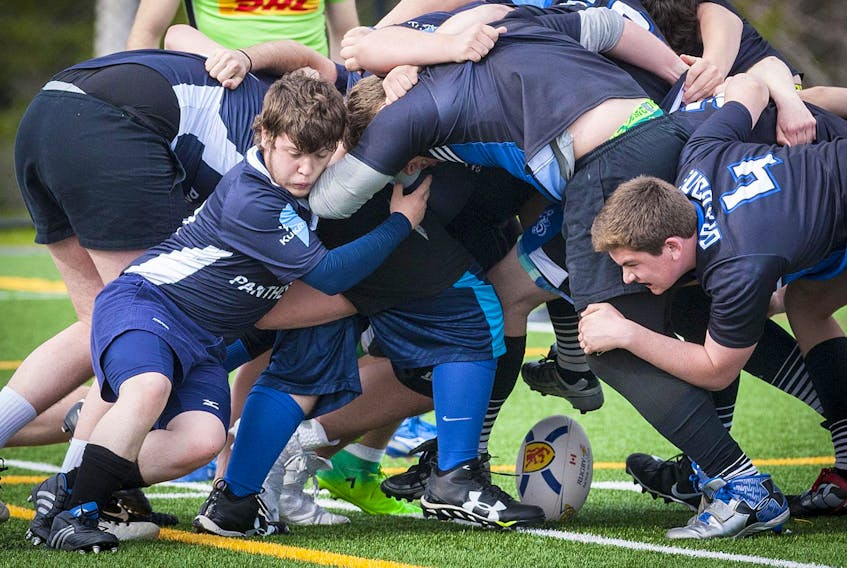Hundreds of high school rugby players in Nova Scotia took their boots and mouthguards to school on Thursday, ready for a practice or a game after school.
Before the day was out, their curriculum was adjusted to include a lesson in faceless bureaucracy.
In the midst of its spring meeting, the board of governors of the Nova Scotia School Athletic Federation sent a brief memo to principals informing them that high school rugby is dead.
Not at the end of the season but now.
Was due to referee two high school games this afternoon, and have just been informed that the provincial school sport federation has cut rugby effective noon today. Massive blow to the sport in Nova Scotia. pic.twitter.com/z1Bpwb9O2T
— Bryan Ray (@raysrugby) May 2, 2019
“I can only tell you what the federation told me,” said Brad Boudreau, a teacher at Charles P. Allen High and the metro league co-ordinator for boys rugby. “A board of governors meeting was convened at some point to talk about the student insurance program. They informed us that according to data, we had the highest (number) of head injuries, and that all rugby was to cease as of noon on May 2.”
More CPA students play rugby than any other sport, more than 80, and though Boudreau isn’t a math teacher, he said he knows more kids equals more injuries. He finds it hard to believe that rugby is more dangerous than hockey or football.

“As a man who’s coached (rugby) for 13 years and considers it a big part of my job, I cannot ever again go to a football game in good conscience,” he said. “I just spent time with 60 young people and I’ve got nothing to say to them. ‘Sorry, it’s too rough and you’re not worth the extra insurance premiums.’ I guess you can’t play badminton anymore, you could put an eye out.”
Boudreau guessed the death of a high school rugby player in P.E.I. last year might have played a role in the federation’s decision.
This week, a player at Sydney Academy, an exchange student, was injured in a game and airlifted to hospital in Halifax, where he is reportedly doing well.
Stephen MacNeil, chair of the NSSAF board of governors, and a vice-principal at Glace Bay High, was in Halifax for the board meeting. The principal at Glace Bay wouldn’t provide MacNeil’s cell phone number and hung up abruptly when asked to do so. Calls to the federation office weren’t returned.
One athletic director in HRM described his students as “absolutely pissed” at the decision, and Tashayla Tynes, who played No. 8 for Citadel High, said the decision is “really devastating.”
Tynes and her teammates first found out about the decision via a rugby group chat.
“We went and talked to the athletic director, but she wasn’t telling us anything, then the coach said we’d learn more at the meeting (after school). By then we already knew, but she she made it official, no games, no practices,” she said. “We all cried, it’s a devastation. Rugby is such a tight community, it’s a family.”
Internal NSSAF memo from March which led to the decision to cut High School rugby in Nova Scotia. Note the number in question is 'reported head injuries / possible concussions'. pic.twitter.com/WLPZg98x4y
— Bryan Ray (@raysrugby) May 2, 2019
Tynes is being recruited by at least two university rugby coaches, and also plays for club and provincial sides.
“But without high school rugby, I wouldn’t have started playing rugby at all, and I got socialized because of it. I got scouted to play for Canada, and that pushed me to go further,” said Tynes, who added that rugby made her a better student. “Definitely, because you have to have a certain average to play rugby, so I strived to keep my grades up, so I could be considered for scholarships. It made me take school seriously.”
The memo from the NSSAF board says a review of insurance “incident report data” led to the decision.
But Chris Sutton, who coaches the boys team at Citadel, finds the timing curious.
“Apparently there have been various studies, and the rationale is that rugby has the highest incidence of injuries in all high school sports,” Sutton said. “It’s odd that this is happening now, midway through the season. I think it’s ludicrous. If they were going to do this, it should have been done a long time ago. As far as I know, they didn’t receive this study today.”
Jack Hanratty of Rugby Nova Scotia was also caught off guard. Hanratty is in Victoria this week with the Canadian Under-20 men’s team, which includes three players who were identified by Rugby Canada while playing high school rugby in Nova Scotia.
“To be honest, we’ve been kept out of the loop,” said Hanratty, who had not received any information that a review was underway, though he has spoken to NSSAF executive director Stephen Gallant in the past. “I thought we had a good relationship.”
“A couple of years ago we flew in some people from Rugby Canada to make changes to coaching, we made some positive steps forward. It’s mandatory for high school coaches to have Level 1 (certification) and to learn concussion management,” he said. “I thought we were making really positive strides.”
Note: A petition is already circulating to have the decision reversed
RELATED:
Investigation finds tournament organizers not at fault in P.E.I. rugby player's death
Montague community in shock after death of high school rugby player Brodie McCarthy









